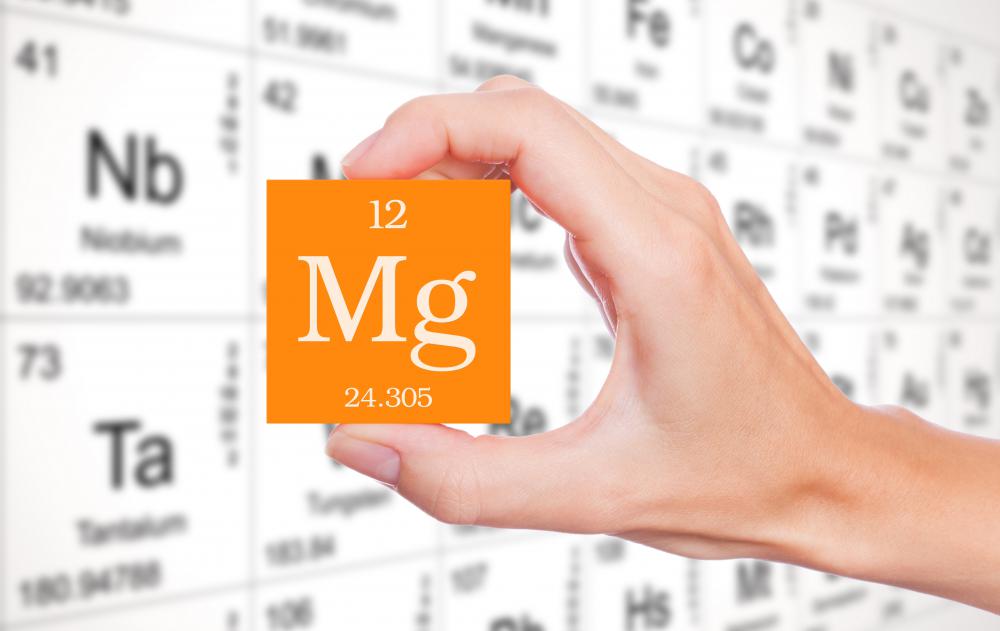At WiseGEEK, we're committed to delivering accurate, trustworthy information. Our expert-authored content is rigorously fact-checked and sourced from credible authorities. Discover how we uphold the highest standards in providing you with reliable knowledge.
What are the Different Types of Calcium and Magnesium Supplements?
Calcium and magnesium supplements come in many different forms. They are usually found as part of a combination vitamin/mineral formula, but may also be found in a specific calcium/magnesium mineral supplement — often with added vitamin D — or simply on their own. Amounts of calcium and magnesium will vary by supplement. As a general rule, it is best to take about half as much magnesium as calcium, because magnesium is needed for proper absorption of calcium. Calcium and magnesium supplements are often formulated together, with less magnesium than calcium.
The two primary forms of calcium found in dietary supplements are calcium carbonate and calcium citrate, though calcium gluconate, calcium lactate and calcium phosphate also may be found. Calcium carbonate is the more inexpensive form, but it may not be absorbed as well as calcium citrate. It is recommended that calcium carbonate be taken with food for best absorption, while calcium citrate can be taken with or without food. In addition, calcium is best absorbed in doses of no more than 500 mg. This means that, if 1,000 mg is taken daily, it should be broken into two doses of 500 mg each.

Magnesium may come in a variety of forms in dietary supplements; magnesium citrate, magnesium oxide, magnesium sulfate, magnesium carbonate, magnesium chloride and magnesium lactate are the most common forms. In addition, magnesium hydroxide is commonly used in formulas for bowel regularity. Many people do not get the recommended amounts of magnesium from the diet and, thus, do not have sufficient magnesium levels, though symptoms of more severe magnesium deficiency are not commonly found in developed countries. Magnesium overdose is rare, usually occurring from over-ingestion of milk of magnesia or Epsom salts.

Calcium and magnesium supplements are available as capsules, powder, liquid, liquid-filled soft gels, syrups, or tablets. In addition, the minerals may be found as a chelated supplement. This is a supplement in which the calcium or magnesium are tightly bound to another molecule.
Calcium and magnesium supplements are important because the essential minerals are not made by the body; they must be obtained from the diet. Calcium is found in many foods, but it is needed in relatively high amounts. Calcium is primarily stored in bones and teeth and plays an important role in many of the body’s functions. Magnesium is the fourth most abundant mineral in the body. About half is found in bone, and the rest is found mostly inside cells, with a small amount present in the blood.
AS FEATURED ON:
AS FEATURED ON:
















Discussion Comments
@raynbow- Take small doses of calcium, and space them out at least twice a day to get the amount you need. The less you take at one time, the less likely it will be that your stomach gets upset from the dosage.
You can also try getting most of your calcium through your diet. Foods that are rich in calcium do not usually cause upset stomach.
@raynbow- I have the same problem, and I have found that it helps to take calcium supplements with food. If you take them on an empty stomach and you are prone to getting an upset stomach, chances are they will cause this unpleasant side effect.
My doctor has recommended that I take a calcium supplement since osteoporosis runs in my family. I'm concerned though because too much calcium has the tendency to upset my stomach. Does anyone have some suggestions for avoiding this uncomfortable side effect of taking calcium?
Post your comments